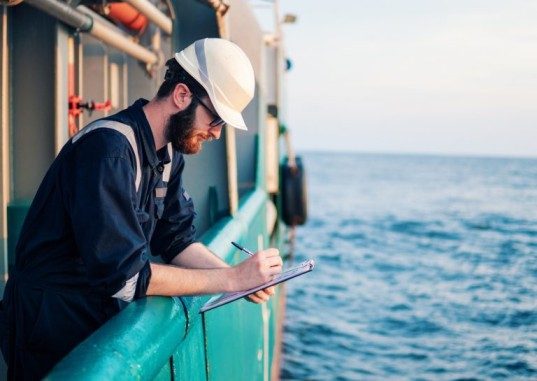
Marine Offshore Data Management Challenges
Marine Offshore Data Management Challenges: Opsealog Founder and Managing Director, Arnaud Dianoux, recently spoke at the Offshore Support Journal conference on the value of the data mindset in today’s marine and offshore sectors,and how this can be leveraged – in combination with maritime expertise – to generate tangible operational efficiencies
Arnaud captained an offshore vessel for four years before founding Opsealog, which specializes in performance management for the energy and maritime sectors. Opsealog was inspired by his strong belief in the value of data when deployed correctly. Here, in the first of two blog posts that recap his presentation at the OSJ conference, Arnaud sets out five steps to take to unlock this value.
The last year has been a challenging one across the globe, with the pandemic disrupting our daily lives and countless businesses and operations. Additionally, the oil and gas sectors face an era-defining transformation, spanning changes in supply and demand patterns to the growing pressure to curb carbon emissions and improve environmental performance. At the same time, energy operators must also control their costs and protect profit. Inevitably, this pressure is also felt by their supply chain partners.
Five steps to successfully implement maritime digital solutions
The process of leveraging data can be broken down and defined by five steps. These steps are key to keep in mind when developing a data-driven strategy.
A useful way of looking at how we leverage data is to compare it to crude oil. By itself, crude oil is of limited use. However, there is a well-defined, tried, and tested set of processes that need to be actioned in order to unlock its value. Once potential sources are identified and the raw material extracted, so begins the process of converting it into something that holds a measurable value. It is then time to process, package, and distribute the product to entities that can make productive use of it.
We can follow these same principles to extract value from data.
1. Define your goals and align them with your strategy
Step one: Your goals need to be bespoke to your operations and the questions you need to answer. There is no off-the-shelf option here. Be clear on what you need to achieve.
2. Assess different sources of data
Step two involves assessing different sources of data. This can be challenging, but identifying, collecting and integrating data from various suppliers and assets, be it in-house or from third parties, collected centrally or sourced from your offshore assets – is imperative.
3. Transform raw data into actionable insights
Step three is about turning raw data into actionable intelligence, with the aim of generating tangible benefits. For this, an algorithm will be required, combined with insights by subject matter experts, such as those on the Opsealog operational team. No single algorithm can be applied to every business model or strategy, so the dissection of specific details and implementation of a tailored data solution is crucial at this point.
The main takeaway from this step is that businesses are given greater insight into their operations – not merely through the use of an algorithm, but by developing a deeper understanding of the intricacies of operations, and the factors influencing their success or inefficiency. This is achieved through in-depth analysis of results, and ongoing input into how a strategy can be adjusted to maximise productivity and reduce costs.
4. Analyze and Optimize
Step four is the optimization phase, where the process of converting data and KPIs into action comes into view. Using these insights, your team can analyze performance and act upon the data whilst continually refining procedures and improving processes as the data management strategy matures.
5. Industrialize
Step five, the final and most important step, involves ‘industrialization’ of the now-matured process, scaling up and extracting as much insight as possible. By refining the strategy, continuing to collect data, aligning it with objectives, and actioning data-driven decisions, a team can further its efforts to improve efficiency on a global scale.
How benefits from marine offshore data management stack up
Good data gives you greater visibility over your operations, enabling the implementation of more effective performance management practices. This in turn, reduces operational and business risks.
Being data-driven also prepares an organization to face new challenges. With the increased visibility of your operations and continued analysis of your short, medium, and long-term strategy during each stage of rollout, you will be able to react more quickly as required to changing circumstances. This will help accelerate your data maturity, improve your results and embed a more adaptable and efficient approach.
As we have learned in the past year, the challenges we face can vary, including those we least expect – from the energy transition to a global pandemic. This is why it is important for an organization to prepare itself and be nimble in its approach.
